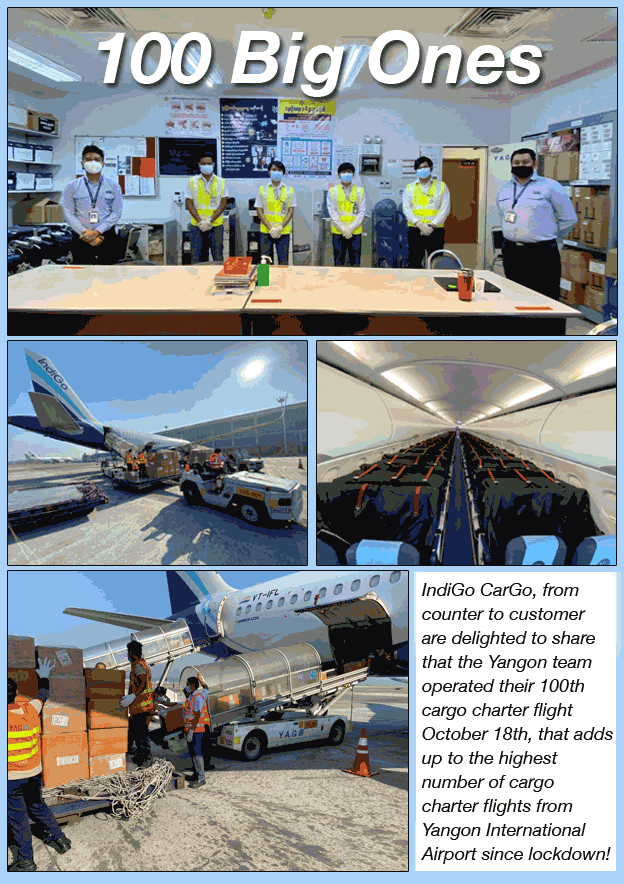 |
IndiGo, India’s top carrier by market
share, has been known to be the strong and silent one. It innovates quietly
and moves on.
However, on one count, IndiGo has been a late
starter, having lost the advantage to first mover SpiceJet, in initiating
a freighter business.
IndiGo promoter Rahul Bhatia is now waking up
to cargo in a big way.
A late convert to the potential of cargo, IndiGo
is trying to catch up amd make up for lost ground.
As one of the innovative airlines in India as
well as around the world, why did it take so long for IndiGo to jump on
to the cargo scene in a big way?
William Boulter, Chief Commercial Officer, IndiGo
speaking to ACNFT said: “We had started focusing on CarGo
(the cargo division of IndiGo) some years back, and it was a critical
part of our ancillary revenues. The pandemic further accentuated the potential
of the CarGo business for us as it provided revenues in the absence of
scheduled commercial flight operations within India or internationally.”
He went on to emphasize that “Covid-19
has re-established CarGo’s importance in the airline business with
plenty of opportunities in the future, and we are confident of its longer-term
development post-Covid—hence the investment in a freighter fleet,
which will use the same pool of cockpit crew and engineers that we use
for our 230 plus Airbus fleet.”
“There was “an enormous variety
of air CarGo, and, with the four A321P2Fs, we plan to begin inducting
in 2022, we intend on servicing every possible commodity from perishables
through electronics to express e-commerce,” said the CCO.
 |
Quiet Strengthening Ongoing
Boulter pointed out that there has been
a cargo team since 2013 and IndiGo has been quietly strengthening it.
SpiceJet’s former Chief Financial Officer Kiran Koteshwar has been
picked as an advisor for the cargo project and he has been recruiting
personnel from FedEx and Blue Dart.
There are chances that IndiGo could form
an alliance with a global integrator like FedEx or UPS. As Boulter acknowledged
to a reporter, that “it’s only when you carry cargo on long-haul
routes that you start getting premium yields.”
COVID Lit The Fire
The pandemic provided the boost that was
needed to start thinking seriously about cargo. “The CarGo business
was very helpful for the aviation industry during the pandemic as it generated
revenues in place of decreased scheduled commercial flight operations
within India and internationally. We learned valuable lessons about the
demand and scope for CarGo which will definitely serve us well for augmenting
our CarGo operations in the months ahead,” said Boulter.
He recounted how “we entered the crisis
with no freighters, but we deployed 12 A320/321 passenger aircraft for
CarGo operations as our 'CarGo-in-cabin' charters. We have been able to
carry significant payloads on our passenger aircraft, depending on commodity,
by using the aircraft belly space and adding some minor equipment and
procedural changes in the cabin.
“We have uplifted more Postal mail
for the government than ever before. We went to a new level with the carriage
of essential supplies and medicines in the early weeks of the lockdown,
and we have contributed to the cause by transporting the vaccines to regional
cities thanks to our extensive network and unparalleled flight frequency.”
The new modes of revenue generation, Boulter
said, would play a crucial role in the long-term prosperity of the sector.
Keeping Track
All this has been possible with the use of the
latest technologies available during the pandemic. Boulter mentioned that
“we have incorporated real time tracking of all the COVID 19 vaccine
boxes which have moved across the length and breadth of the country. Considering
the sensitivity of the commodities, we have also been carrying oxygen
concentrators, medical equipment, and critical hospital supplies during
this period. The speed of movement coupled with the use of technology
has been a winning combination for our success in CarGo logistics. The
launch of our very own CarGo Shipper application for both Android and
IOS platforms has been a grand success with over 48 percent usage across
the network”.
He emphasised that IndiGo’s goal was ease
of business with the use of technology and “we have a number of
digital implementations planned towards the end of this year.”
A321F IndiGo On Tap
Indigo has initiated a freighter programme and
is in the process of sourcing four A321 aircraft. “The A321P2F—Passenger-to-Freighter
conversion is the most efficient narrow-bodied freighter available, offering
24 container positions and supporting a payload of up to 27 tonnes,”
said Boulter and added that “the delivery of our first freighter
is expected in first half of CY2022.”
Helping the cause of home-grown cargo carriers
like SpiceJet and IndiGo, in December last year, the government put its
foot down on non-scheduled cargo operations by foreign airlines to Bengaluru,
Chennai, Delhi, Kolkata, Hyderabad and Mumbai. The then Civil Aviation
Minister Hardeep Singh Puri said the change was done to give a level-playing
field to Indian airlines. In fact, IndiGo’s CEO Ronojoy Dutta had
commented then that his airline would take advantage of the gap created
by the absence of foreign carriers.
Boulter was of the opinion that India had a strong
potential in the air cargo segment due to a fast-growing economy and unsatisfied
demand that has been further accentuated with the advent and distribution
of vaccines. “IndiGo CarGo flight operations in “CarGo-in-cabin”
mode were initiated to support the nation to maintain supply chains for
essential commodities, and this innovation helped in identifying opportunities
to bring in some revenue through domestic and international charters during
the lockdown. Owing to restricted belly capacity, CarGo remains a focus
area for IndiGo, and we expect that “CarGo in cabin” charters
will continue to some extent even beyond 2021.”
Cargo Business Soaring
And, the move has paid off. As Boulter acknowledged,
“IndiGo increased its CarGo revenue by almost 10 percent through
2020/21 even though the passenger belly capacity was massively reduced.
This was done through deployment of over 6,500 CarGo-in-cabin charters,
to date, and increased yields for the CarGo flown in our bellies. We face
the future with confidence and expect a healthy growth in revenues,”
he said.
Post-Covid, once the passenger aircraft belly
capacity returns in full force, the current strong market for freighters
will reduce incrementally. However, he was quick to point out, that “there
will always be a certain level of demand for freighter aircraft, especially
for commodities which are not allowed to be transported by passenger flights.
Once the economy resumes a strong growth path and there is an additional
export drive, then more opportunities are likely to emerge.”
He explained that the belly capacity of widebody
passenger aircraft was sufficient in most cases between international
points, and where it was not, “then you will see proper freighter
aircraft deployed, as before—for instance between China and India.
There may still be the occasional missions for ‘CarGo-in-cabin’,
but this will only be during temporary shortages of supply. For IndiGo,
our normal belly capacity and the A321P2F freighters are the future,”
he said.
He also pointed out that “we operate a
broad network point-to-point within India and beyond, to over 70 domestic
cities and 24 internationally. Whilst there is a current need for transhipment
at various times, the real need for ‘feed’ will come with
the introduction of the freighters.”
Tirthankar Ghosh
|




